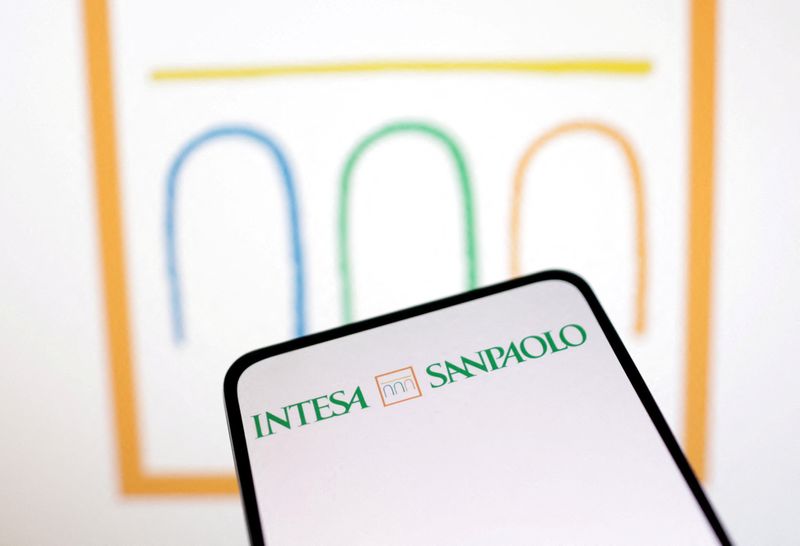By Valentina Za
MILAN (Reuters) - Record annual profits from Italy's two biggest banks last week showed both Intesa Sanpaolo (BIT:ISP) and UniCredit (LON:0RLS) benefiting from a drop in loan losses, but also highlighted different policies towards provisions.
The cost of risk - which measures provisions to cover loan losses as a proportion of total loans - was 36 basis points (bps) at Intesa (LON:0HBC) and 12 bps at smaller rival UniCredit.
As higher interest rates boost lenders' profits while failing so far to hurt borrowers, bank investors stand to benefit.
UniCredit will pay out as share buybacks and dividends all of its 2023 profit, net of a tax asset write-back. Intesa also pledged a buyback after booking double the provisions of UniCredit in the fourth quarter.
When asked about the differences in the cost of risk, Intesa Chief Executive Carlo Messina said his bank had chosen never to go below 30 bps, even when there was no immediate need to write down loans and book charges.
"Historically banks have a floor for their cost of risk which is really hard to go below," said Stefano Gatti, finance professor at Milan's Bocconi University. All loans involve some risk, and so it is impossible for banks to reduce provisions to extremely low levels without slashing lending.
UniCredit declined to comment for this story, but an industry source noted that while Intesa operates mostly in Italy - where loan losses are traditionally higher - UniCredit's business spreads across 13 markets, with Italy accounting for 46% of group revenue, Germany for 23%, and central and eastern Europe for 18% and 12% respectively.
Banks can book generic provisions on their performing loan portfolio, known as overlays, to shield their assets from risks that are not captured by models used to calculate expected credit losses.
At 1.8 billion euros ($1.9 billion), UniCredit's overlays are the highest in its peer group, according to Jefferies, and double Intesa's 900 million euros.
However, overlays cannot be held indefinitely if the risks do not materialise, and their use has sparked a debate among banking regulators.
European Central Bank supervisors have highlighted "significant differences" in the use of overlays on performing loan portfolios and conducted a review to "establish credible and consistent provisioning practices".
As a further line of defence, UniCredit has more than 10 billion euros of capital in excess of its target threshold, which analysts said underpinned its hefty shareholder payouts.
The group also says strict lending criteria following years of restructuring have lowered the expected credit loss, which drives provisioning.
Gatti noted shrinking loan volumes could eventually affect banks' profits if the cost of risk is kept low by extremely tight underwriting criteria.
'PUT ASIDE MONEY'
The ability of banks to cope with a sudden rise in bad loans has moved into the spotlight following the fastest-ever cycle of rate hikes in the euro zone and a slowdown in economic growth.
Despite record profits and often generous payouts to shareholders, European banks trade at a discount to U.S. rivals, in part because investors are worried about the weakness of Europe's economy relative to the United States.
New Bank of Italy Governor Fabio Panetta on Saturday warned that dangers in the banking system creep up unseen during rosy spells, and urged Italian banks to use last year's profits to boost capital reserves.
"The current macroeconomic backdrop is weak, rates are still high and default rates are expected to increase further. As the Bank of Italy recently suggested it makes sense to put aside money in good times," Bocconi's Gatti said.
For this year, UniCredit expects its cost of risk to be below 20 bps, whereas Intesa, which books part of its provisions to be able to sell down impaired loans, sees it below 40 bps.
Following is a detailed look at the coverage ratios of the loan portfolios of Intesa and UniCredit, both performing and non performing, with relative sub-sets.
Intesa's gross impaired loans were 2.26% of total lending at end-2023 (1.16% net of provisions), UniCredit's 2.7% (1.4% net).
The aggregate gross ratio for ECB-supervised banks was 2.26% in the third quarter.
Provisions covered 50% of Intesa's impaired loans at end-2023, versus 47% at UniCredit.
($1 = 0.9295 euros)
ISP: A Bull or Bear Market Play?
Don't miss out on the next big opportunity! Stay ahead of the curve with ProPicks – 6 model portfolios fueled by AI stock picks with a stellar performance this year..
In 2024 alone, ProPicks' AI identified 2 stocks that surged over 150%, 4 additional stocks that leaped over 30%, and 3 more that climbed over 25%. That's an impressive track record.
With portfolios tailored for Dow stocks, S&P stocks, Tech Stocks, and Mid Cap stocks, you can explore various wealth-building strategies.
So if ISP is on your watchlist, it could be very wise to know whether or not it made the ProPicks lists.
